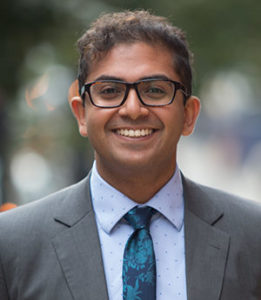


Abhik joins the USGLC after serving as a Fulbright grantee in the city of Daejeon, South Korea. In Korea, he conducted research on the startup ecosystem in Pangyo Techno Valley in addition to fulfilling his teaching duties. Prior to living abroad, he graduated from the University of California, Berkeley where he received a degree in political economy. While an undergrad, he completed several policy based internships. Most notably, he interned in the Office of Policy at the U.S. Agency for International Development. A Maryland native, Abhik is happy to be back on the East Coast after five long years.
UN Secretary-General António Guterres has made reforming the United Nations to more effectively respond to global crises one of his key priorities. Earlier this month, the United Nations adopted Secretary-General Guterres’ proposal to overhaul the UN’s Peace and Stability operations to enhance the ability of the UN to better respond to today’s challenges and conflicts.
President Trump’s comments have ignited a debate over what the United States’ role should be following the de-escalation of military conflict in war-torn states. In order to maintain the military’s hard fought gains and prevent the return of ISIS, it’s critical that people are able to return home to begin the hard work of rebuilding their country.
Over the past three decades, global poverty has declined by nearly 70 percent as hundreds of millions of people have been lifted out of poverty. Despite this tremendous progress, more must be done to fill an enormous void: the U.N.’s Sustainable...
Amidst continuing budget uncertainty, USAID Administrator Mark Green has responded to the President’s guidance for all agencies to “improve [their] efficiency, effectiveness, and accountability” with a smart set of proposals known as “USAID Transformation.” Designed to strengthen the agency’s capacity to respond to the growing humanitarian crises and challenges around the world, the proposal lays out a plan to strengthen the agency at a time when efficiency and effectiveness are particularly important to shore up funding.
In recent weeks, some of our nation’s top military leaders—the heads of the regional Combatant Commands—have testified on Capitol Hill. Speaking about the threats they face around the world, every Commander stressed that the State Department...
As the international community gears up to tackle the emerging challenges of 2018, two enduring problems must first be addressed: ongoing violent conflicts and subsequent humanitarian emergencies. Since 2010, state-on-state conflict has increased by 60 percent, and conflict within countries has increased by 125 percent. As a result of this dangerous trend, the number of people forced to flee their homes is at an all-time high since World War II.
Speaking in Vietnam just a few hours ago, President Trump launched a debate on the future of development finance by committing the Administration to help American businesses invest and compete in the developing world.
On September 12th, the United Nations kicks off its 72nd General Assembly with leaders from across the globe in attendance. Coordination of the U.N.’s humanitarian and disaster relief efforts will be central to the conversation, especially in Yemen, which was recently declared the world’s largest humanitarian crisis by the heads of several global humanitarian agencies.
These three case studies provide contrasting models for diplomacy and development. In Australia’s case, subsuming development under diplomacy has led to concerns that Australian foreign assistance has become less accountable. In Canada, though...
As Secretary Tillerson and the Foreign and Civil Service Officers he leads around the world face unprecedented challenges—including the largest number of refugees since World War II, four famines affecting more than 20 million, and the risk of another global pandemic—he should consider building on the success of his predecessors, who recognized the new challenges our country faces, rather than ignoring their contributions.
Get the latest news, advocacy, and event updates from the USGLC
Copyright 2025 USGLC | Privacy Policy
Notifications